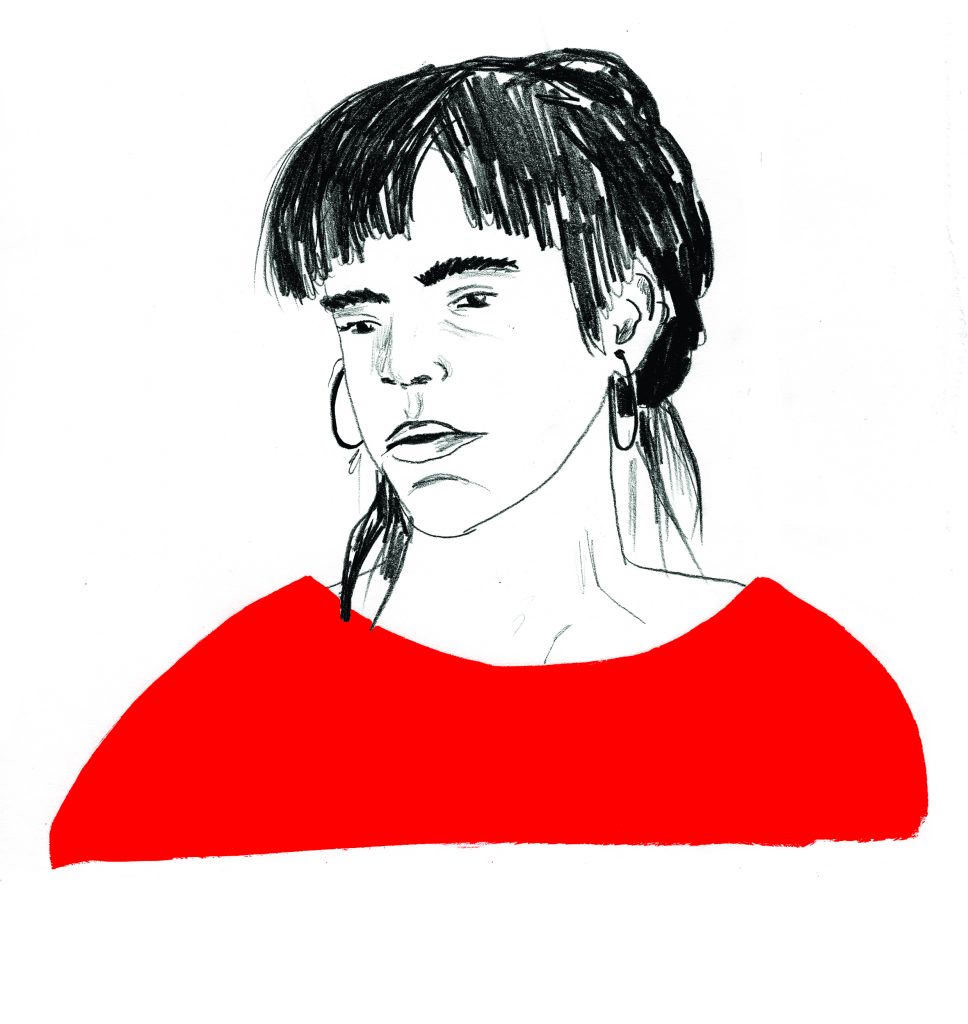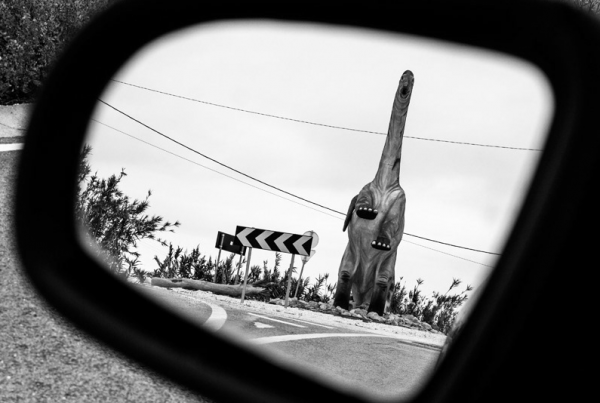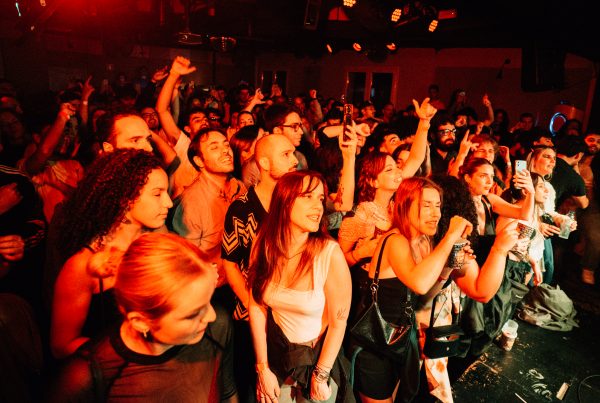
Puçanga released the album Fazer da Trip Coração (2021) and will soon release the EP Impish. Her music is a mix of electronic sounds with a melodic and exploratory voice. In her work, she explores the power of the voice and her compositions and lyrics are inspired by a certain claiming of folklore, ideas of social justice and imagining places where we go beyond the limits of our perception. Music as home remedy. She is a composer, songwriter, and music producer.
Comecei a interessar-me pelo folclore após viver na Argentina. Em Buenos Aires sente-se o poder popular. É uma sociedade mobilizada nas várias classes sociais, atravessada pela música em todo lado: na rua, nos transportes, nos centros culturais, nas villas (favelas). Há um respeito enorme pela música de Mercedes Sosa, Leda Valladares, Atahualpa Yupanqui ou Violeta Parra, cujas reverberações continuam a sentir-se na música feita hoje. Outro exemplo forte é a Susy Shock, activista pela diversidade de género, poeta, cantora e coplera. Há também a cumbia villera, nascida nas villas ao som de um órgão psicadélico e trash, ou o candombe, um ritmo uruguaio que se ouve frequentemente pelas ruas.
Em Portugal, o folclore foi tipificado para enaltecer um projecto fascista e iniciativas contra-hegemónicas foram perseguidas ou branqueadas. Durante o salazarismo, os ranchos folclóricos foram regulamentados pelo SNI. Hoje, o typical portuguese é um produto para o turismo de massas que tem descaracterizado e encarecido o país. Quando a criação cultural própria de um lugar existe só para gerar lucro ou sentido nacional, a sua existência torna-se frágil e a diversidade desaparece.
Vejo o folclore como uma coisa viva. Folk (povo) + lore (ciência) = saber popular. Vem da experiência e tem uma mente open source. Nas histórias, nas canções, na moda, nos utensílios, nas receitas. Está conectado com o seu contexto e altera-se organicamente à medida que este se transforma. Neste sentido, a transformação da música tradicional sempre existiu.
Na minha música, produzo canções originais com sonoridades electrónicas, mas também me inspiro no folclore. Há algo que une estes dois elementos: o sentimento de querer estar junto, a dançar, a ouvir. No álbum Fazer da Trip Coração, fiz uma versão da Cantiga da Ceifa. No meu EP Impish, quase a sair, lanço um arranjo da canção venezuelana Polo Margariteño.
Admiro projectos musicais que esbatem fronteiras e fazem avançar aquilo que entendemos por música tradicional. Fausto, Zeca Afonso ou José Mário Branco deixaram-nos essa memória revolucionária e sentimental nas veias. No contexto nacional actual, há muito por onde ir. Fado Bicha trazem-nos questões políticas, e polémicas, nas letras. Conan Osiris é uma ilha entre o popular do subúrbio, a pop e o tradicional. Pan.demi.ck une o respeito do mundo ancestral-pagão ao respeito da festa livre. Maria Reis é uma boyish sentimental maravilhosa que trasha melodias tradicionais com os instrumentos e a voz. Criatura expande a memória musical beirã numa forte energia de palco. Tristany ou Xulaji continuam a frente da luta descolonial através da música.
No contexto internacional, Tanya Tagaq recupera o canto inuit numa estética punk. Rodrigo Cuevas vinca a cultura asturiana numa afirmação queer. Rosalía atira o folclore contra a sua imaginação compulsiva. La Bruja de Texcoco contrasta com delicadeza a transfeminilidade e as identidades mexicanas.
O ponto fundamental é incentivar a criação consciente entre a tradição e o contemporâneo. Apoiar os artistas, de maneira a que sejam responsáveis no acto de criar. Reclamar o espaço público e a manifestação livre. Confiar na rebeldia do saber popular.
/ Tradução por Linda Formiga
English Version
Ballroom culture, diaspora and me
I became interested in folklore after living in Argentina. In Buenos Aires, you can feel the power of the people. It is a society mobilised in the various social classes, where music is present everywhere: in the streets, in transports, in cultural centres, in the villas (shanty towns). There is enormous respect for the music of Mercedes Sosa, Leda Valladares, Atahualpa Yupanqui or Violeta Parra, and one can still sense their reverberations in the music made today. Another powerful example is Susy Shock, activist for gender diversity, poet, singer and coplera. There is also cumbia villera, born in the villas to the sound of a psychedelic and thrash organ, or candombe, a Uruguayan rhythm that is often heard in the streets.
In Portugal, the State typified folklore to praise a fascist project while counter-hegemonic initiatives were persecuted or whitewashed. During Salazarism, the National Secretariat of Information, Popular Culture and Tourism (SNI) regulated the folk dance groups. Today, the typical Portuguese is a product for mass tourism that has been mischaracterising and turning the country more expensive. A place specific cultural creation becomes fragile and diversity disappears when it only exists to generate profit or national meaning.
I see folklore as a living thing. Folk (people) + lore (science) = folk knowledge. It comes from experience and has an open source mind. In stories, in songs, in fashion, in utensils, in recipes. It relates to its context, and it changes as the former transforms. In this sense, traditional music transformation has always existed.
In my music, I produce original songs with electronic sounds, but I also draw inspiration from folklore. There’s something that unites these two elements: the desire of being together, dancing, listening. On the album Fazer da Trip Coração, I did a version of the folk song Cantiga da Ceifa. On my EP Impish, almost out, I’m releasing an arrangement of the Venezuelan song Polo Margariteño.
I admire musical projects that break down borders and advance what we understand as traditional music. Fausto, Zeca Afonso, or José Mário Branco left us with that revolutionary and sentimental memory in our veins. In the current Portuguese scene, there’s a lot to go on. Fado Bicha brings us political and polemic issues in their lyrics. Conan Osiris is an island between suburban folk, pop and traditional. Pan.demi.ck unites the respect of the ancestral-pagan world with the respect of free celebration. Maria Reis is a wonderful sentimental boyish girl who trashes traditional melodies with her instruments and voice. Criatura expands the Beiran musical memory in a strong stage energy. Both Tristany and Xulaji continue the decolonial struggle through music.
In the international context, Tanya Tagaq recovers the Inuit chant in a punk aesthetic. Rodrigo Cuevas turns Asturian culture into a queer statement. Rosalía pits folklore against her compulsive imagination. La Bruja de Texcoco delicately contrasts trans-femininity and Mexican identities.
The fundamental point is to encourage conscious creation between tradition and the contemporary. Support artists so that they are responsible during the act of creating. Reclaim public space and free expression. Trust in the rebelliousness of popular knowledge.



